Daily Vocabulary Words: List of Daily Used Words in Leading Indian Newspapers
Hi there. Welcome to this special section @ Wordpandit. Our endeavour here is straightforward: highlighting daily vocabulary words that you would come across in leading newspapers in the country. We have included the following newspapers in our selection:
• The Times of India
• The Economic Times
• Hindustan Times
• Mint
• Indian Express
We are putting in extensive work to develop your vocabulary. All you have to do is be regular with this section and check out this post daily. This is your repository of commonly used words; essentially, we are posting a list of daily used words. Hence, this has significant practical application as it teaches you words that are commonly used in leading publications mentioned above.
Visit the website daily to learn words from leading Indian newspapers.
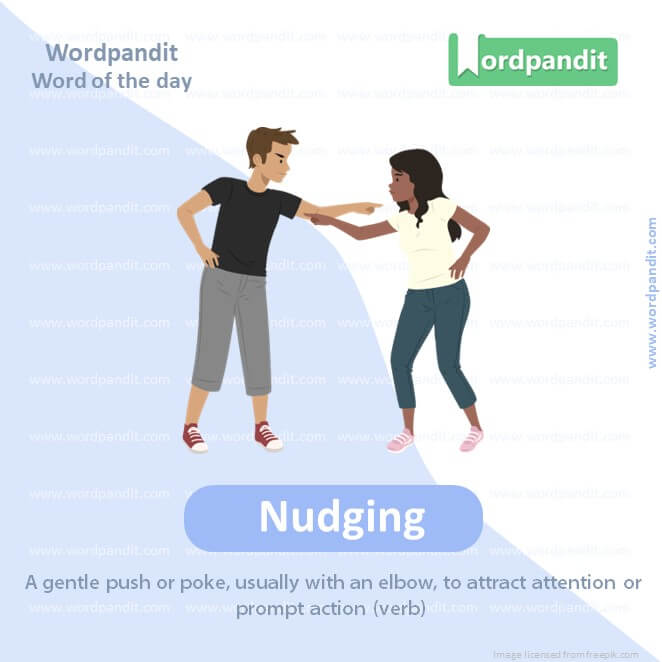
WORD-1: Nudging
CONTEXT: Any responsible public policy towards alcohol should respect an individual’s free choice while nudging them towards decreasing intake and consuming safer forms of alcohol.
SOURCE: Indian Express
EXPLANATORY PARAGRAPH: Imagine you want to remind your friend quietly to pay attention or move a little bit. You might gently push them with your elbow or hand. That’s called “nudging.” It’s like a small push or poke to get someone’s attention or to tell them to do something without using words.
MEANING: A gentle push or poke, usually with an elbow, to attract attention or prompt action (verb).
PRONUNCIATION: nuh-jing
SYNONYMS: prodding, poking, elbowing, bumping, urging, jostling
USAGE EXAMPLES:
1. She nudged her brother to stop him from snoring.
2. I nudged my friend to look at the strange bird.
3. The teacher nudged the students towards the right answer.
4. He nudged the door open with his foot.
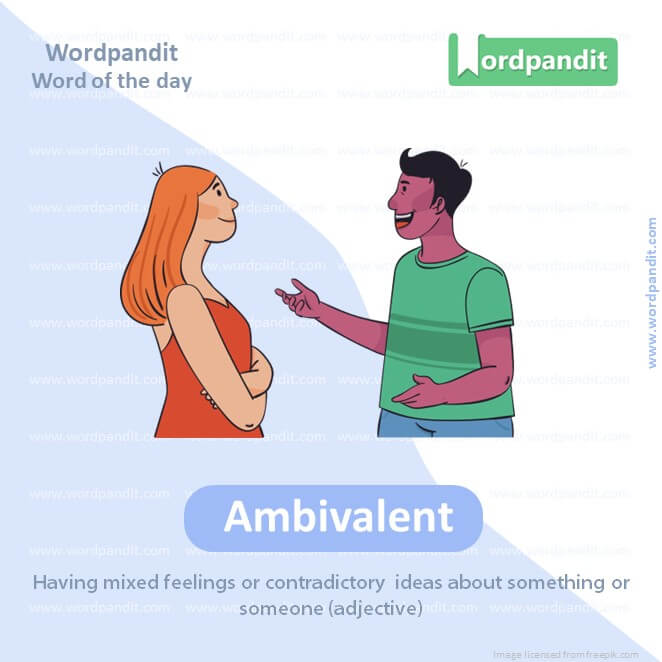
WORD-2: Ambivalent
CONTEXT: Indian public policy’s approach to alcohol reflects our society’s ambivalent attitude towards it.
SOURCE: Times of India
EXPLANATORY PARAGRAPH: When you can’t decide if you like something or not, or when you feel happy and sad at the same time about something, that’s being “ambivalent.” It’s like when you both want to go to the park and stay home at the same time.
MEANING: Having mixed feelings or contradictory ideas about something or someone (adjective).
PRONUNCIATION: am-biv-uh-luhnt
SYNONYMS: undecided, mixed, uncertain, conflicted, hesitant, unsure
USAGE EXAMPLES:
1. She was ambivalent about moving to a new city.
2. His feelings about the job offer were ambivalent.
3. They were ambivalent about the decision.
4. The movie left me feeling ambivalent.
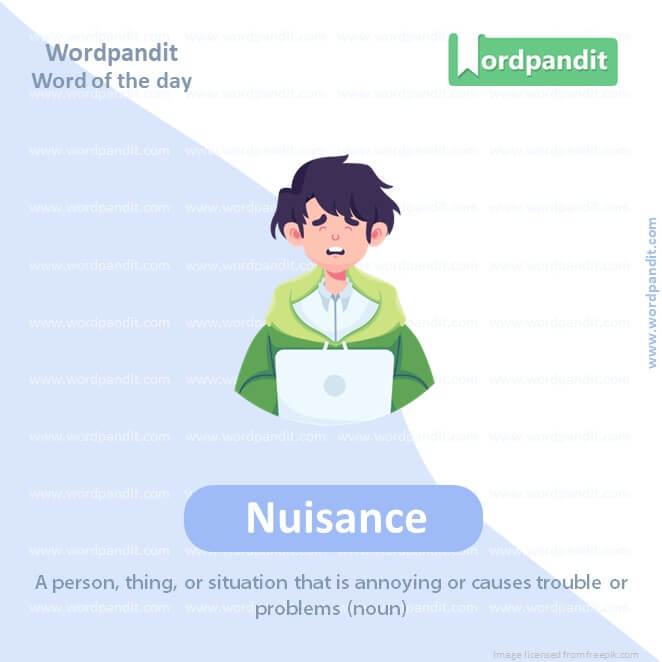
WORD-3: Nuisance
CONTEXT: when one is not able to discharge one’s role or becomes a nuisance to others in the family or society regularly.
SOURCE: Hindustan Times
EXPLANATORY PARAGRAPH: A nuisance is something or someone that bothers you or makes things hard. It’s like a little brother who keeps making noise when you’re trying to read. He’s not really doing anything bad, but it’s still annoying.
MEANING: A person, thing, or situation that is annoying or causes trouble or problems (noun).
PRONUNCIATION: noo-suhns
SYNONYMS: annoyance, bother, pest, irritant, inconvenience, disturbance
USAGE EXAMPLES:
1. The noisy neighbors are a real nuisance.
2. Mosquitoes can be a huge nuisance in the summer.
3. Finding a parking spot here is always a nuisance.
4. He considered his little sister a nuisance.
WORD-4: Cirrhosis
CONTEXT: If an individual suffers due to alcohol use disorder — say with cirrhosis of the liver — the attitude often is that no sympathy should be wasted.
SOURCE: Indian Express
EXPLANATORY PARAGRAPH: Cirrhosis is a word for a sickness that happens to someone’s liver, the part inside your tummy that helps clean your blood. When someone has cirrhosis, their liver is hurt and can’t clean the blood as well as it should.
MEANING: A severe liver disease caused by long-term damage, leading to scarring and liver failure (noun).
PRONUNCIATION: suh-roh-sis
SYNONYMS: liver disease, hepatic scarring, chronic liver damage, liver failure
USAGE EXAMPLES:
1. Drinking too much alcohol over many years can lead to cirrhosis.
2. Cirrhosis is a serious health condition.
3. The doctor explained the complications of cirrhosis.
4. She was diagnosed with cirrhosis due to chronic hepatitis.
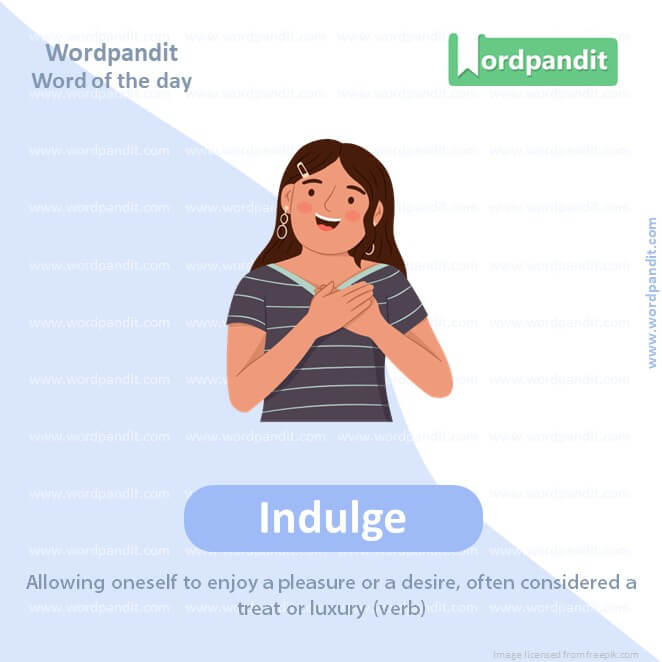
WORD-5: Indulge
CONTEXT: Women consume alcohol and one in five of them are dependent or indulge in harmful use and need treatment.
SOURCE: Indian Express
EXPLANATORY PARAGRAPH: When you indulge, it means you let yourself have something really enjoyable, especially a treat or something you don’t get very often. Like when you have an extra scoop of ice cream or stay up past your bedtime to watch a movie.
MEANING: Allowing oneself to enjoy a pleasure or a desire, often considered a treat or luxury (verb).
PRONUNCIATION: in-duhlj
SYNONYMS: pamper, spoil, treat, gratify, enjoy, relish
USAGE EXAMPLES:
1. She decided to indulge in a spa day.
2. On vacation, they indulged in their favorite foods.
3. It’s okay to indulge yourself once in a while.
4. They indulged in a lazy Sunday morning.
WORD-6: Equate
< STRONG>CONTEXT: Upper castes equate alcohol use with “tamasic” food, taking a moral high ground, while most tribal societies openly embrace it.
SOURCE: Indian Express
EXPLANATORY PARAGRAPH: When you equate two things, you’re saying they’re pretty much the same. It’s like when you say that getting a star on your homework is like getting a high-five; you’re equating them because they both mean you did a great job.
MEANING: To consider one thing to be the same as or equivalent to another thing (verb).
PRONUNCIATION: ih-kwayt
SYNONYMS: compare, liken, parallel, associate, correlate, match
USAGE EXAMPLES:
1. You shouldn’t equate money with happiness.
2. They equate success with hard work.
3. In her mind, she equated love with pain.
4. He tends to equate being busy with being important.
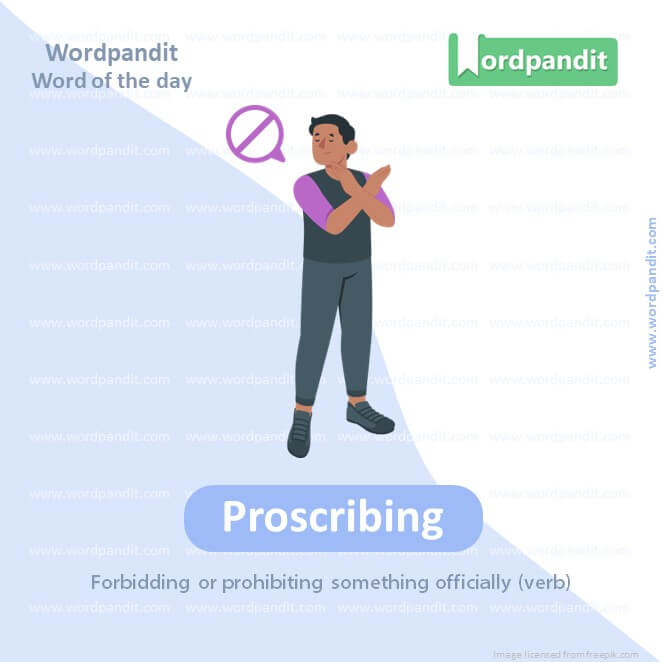
WORD-7: Proscribing
CONTEXT: A balance has been struck by society by proscribing it on some days and allowing it on others.
SOURCE: Indian Express
EXPLANATORY PARAGRAPH: Proscribing is like making a rule that says you can’t do something. It’s like when your teacher says no running in the hallway. That’s proscribing running in the hallway.
MEANING: Forbidding or prohibiting something officially (verb).
PRONUNCIATION: proh-skrahy-bing
SYNONYMS: forbidding, banning, outlawing, prohibiting, interdicting, disallowing
USAGE EXAMPLES:
1. The new law proscribes smoking in public areas.
2. The school handbook proscribes cheating and plagiarism.
3. They proscribed the use of mobile phones in the meeting.
4. Certain behaviors are proscribed by social norms.
WORD-8: Intoxicating
CONTEXT: the consumption except for medicinal purposes of intoxicating drinks and drugs which are injurious to health.
SOURCE: Indian Express
EXPLANATORY PARAGRAPH: Intoxicating is a word for something that makes you feel really happy, excited, or even a bit dizzy, like the way you feel when you spin around really fast. It can also mean something that’s so fun or interesting, you can’t think about anything else.
MEANING: Causing excitement, happiness, or a feeling of being slightly out of control; also used to describe substances that affect your mind (adjective).
PRONUNCIATION: in-tox-i-kay-ting
SYNONYMS: exhilarating, heady, stimulating, thrilling, enchanting, captivating
USAGE EXAMPLES:
1. The view from the mountain was intoxicating.
2. She found his charisma intoxicating.
3. The atmosphere at the carnival was intoxicating.
4. Wine can have an intoxicating effect.
WORD-9: Muddled
CONTEXT: This muddled approach is compounded by the bureaucracy.
SOURCE: Times of India
EXPLANATORY PARAGRAPH: When something is muddled, it’s all mixed up or confusing. Imagine if you put all your toys in a pile and can’t find your favorite one. That pile is muddled because everything is jumbled up.
MEANING: Mixed up, confused, or unclear (adjective).
PRONUNCIATION: muhd-uhld
SYNONYMS: confused, jumbled, disorganized, bewildered, perplexed, disordered
USAGE EXAMPLES:
1. His thoughts were muddled from lack of sleep.
2. The directions she gave were quite muddled.
3. He gave a muddled explanation of the events.
4. The story was muddled and hard to follow.
WORD-10: Uproarious
CONTEXT: Janata legislators in the state triggered uproarious scenes in both houses of Parliament following a determined Opposition bid to pillory the government for trying to topple non-Congress.
SOURCE: Times of India
EXPLANATORY PARAGRAPH: Uproarious is when something is really, really funny or super loud and noisy. It’s like when everyone in class can’t stop laughing at a joke, or a party is so loud with music and talking that it’s hard to hear anything else.
MEANING: Extremely funny, loud, or causing a lot of noise (adjective).
PRONUNCIATION: uh-proar-ee-uhs
SYNONYMS: hilarious, riotous, boisterous, noisy, loud, rowdy
USAGE EXAMPLES:
1. The comedian’s performance was uproarious.
2. They had an uproarious time at the party.
3. The crowd’s response was uproarious.
4. The movie had several uproarious scenes.
vocabulary 10 sentence
In the fascinating world of language learning, one of the most vital and effective methods is the ‘vocabulary 10 sentence’ strategy. An incredibly valuable tool, the ‘vocabulary 10 sentence’ approach assists language learners in an immersive, organic, and contextual manner often used in learning environments.
The ‘vocabulary 10 sentence’ strategy is essentially a practice where learners incorporate a new vocabulary word into 10 different sentences. Doing this repeatedly creates a thorough understanding of the word’s meanings, usage, context, and nuances. It is a learning technique that imitates the natural language acquisition process.
In a ‘vocabulary 10 sentence’ exercise, learners begin with choosing a new word, then crafting ten unique sentences involving that word. While this can seem challenging initially, it rapidly enhances one’s cache of usable vocabulary. Moreover, it allows learners to grasp a different range of contexts and applications for every new word, encouraging them to experiment with their language skills.
In traditional vocabulary learning methods, words are often learned as standalone entities with rigid definitions. In contrast, the ‘vocabulary 10 sentence’ technique encourages an understanding that words are dynamic and can have different meanings based on the context they are used in. This technique helps remove the constraints of rote memorization and promotes active learning instead.
The ‘vocabulary 10 sentence’ technique can be utilized by language learners at all stages. Setting a daily target for learning new words through this method can significantly speed up language acquisition and understanding.
In conclusion, the ‘vocabulary 10 sentence’ strategy can revolutionize the way you learn new languages. This ingenious approach motivates learners to explore beyond a word’s basic definition, diving into its usage in various contexts. By incorporating the ‘vocabulary 10 sentence’ technique into your daily language learning routine, you will actively participate in your own learning process, making it more effective and enjoyable.













